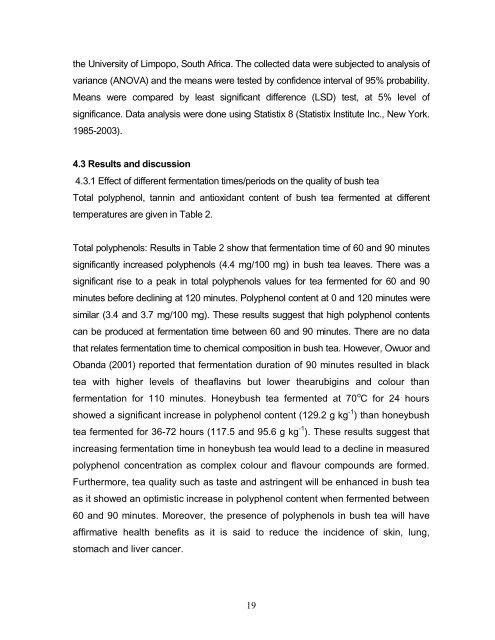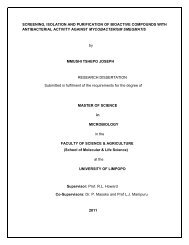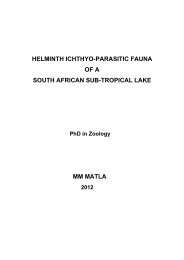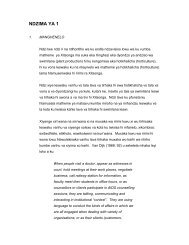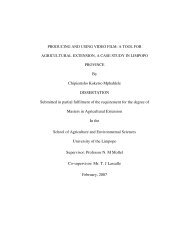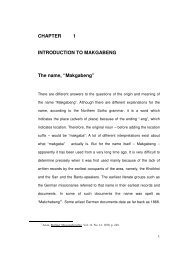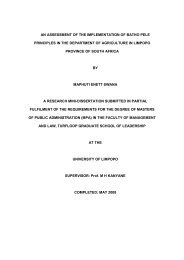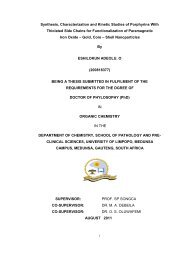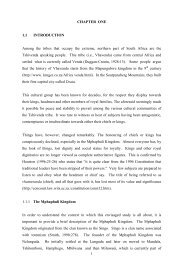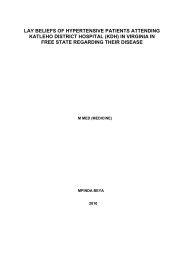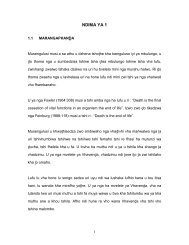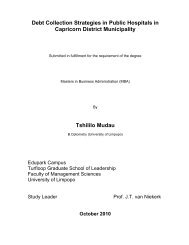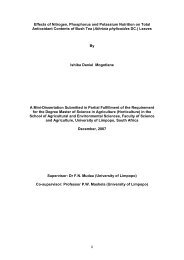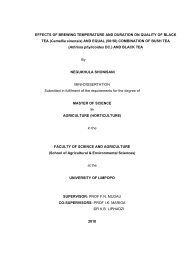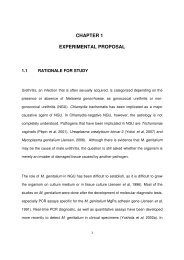Hlahla LN Mini-Dissertation.pdf - University of Limpopo Institutional ...
Hlahla LN Mini-Dissertation.pdf - University of Limpopo Institutional ...
Hlahla LN Mini-Dissertation.pdf - University of Limpopo Institutional ...
You also want an ePaper? Increase the reach of your titles
YUMPU automatically turns print PDFs into web optimized ePapers that Google loves.
the <strong>University</strong> <strong>of</strong> <strong>Limpopo</strong>, South Africa. The collected data were subjected to analysis <strong>of</strong><br />
variance (ANOVA) and the means were tested by confidence interval <strong>of</strong> 95% probability.<br />
Means were compared by least significant difference (LSD) test, at 5% level <strong>of</strong><br />
significance. Data analysis were done using Statistix 8 (Statistix Institute Inc., New York.<br />
1985-2003).<br />
4.3 Results and discussion<br />
4.3.1 Effect <strong>of</strong> different fermentation times/periods on the quality <strong>of</strong> bush tea<br />
Total polyphenol, tannin and antioxidant content <strong>of</strong> bush tea fermented at different<br />
temperatures are given in Table 2.<br />
Total polyphenols: Results in Table 2 show that fermentation time <strong>of</strong> 60 and 90 minutes<br />
significantly increased polyphenols (4.4 mg/100 mg) in bush tea leaves. There was a<br />
significant rise to a peak in total polyphenols values for tea fermented for 60 and 90<br />
minutes before declining at 120 minutes. Polyphenol content at 0 and 120 minutes were<br />
similar (3.4 and 3.7 mg/100 mg). These results suggest that high polyphenol contents<br />
can be produced at fermentation time between 60 and 90 minutes. There are no data<br />
that relates fermentation time to chemical composition in bush tea. However, Owuor and<br />
Obanda (2001) reported that fermentation duration <strong>of</strong> 90 minutes resulted in black<br />
tea with higher levels <strong>of</strong> theaflavins but lower thearubigins and colour than<br />
fermentation for 110 minutes. Honeybush tea fermented at 70 o C for 24 hours<br />
showed a significant increase in polyphenol content (129.2 g kg -1 ) than honeybush<br />
tea fermented for 36-72 hours (117.5 and 95.6 g kg -1 ). These results suggest that<br />
increasing fermentation time in honeybush tea would lead to a decline in measured<br />
polyphenol concentration as complex colour and flavour compounds are formed.<br />
Furthermore, tea quality such as taste and astringent will be enhanced in bush tea<br />
as it showed an optimistic increase in polyphenol content when fermented between<br />
60 and 90 minutes. Moreover, the presence <strong>of</strong> polyphenols in bush tea will have<br />
affirmative health benefits as it is said to reduce the incidence <strong>of</strong> skin, lung,<br />
stomach and liver cancer.<br />
19


